M10 Unit3 Protecting ourselves Reading
文档属性
| 名称 | M10 Unit3 Protecting ourselves Reading | 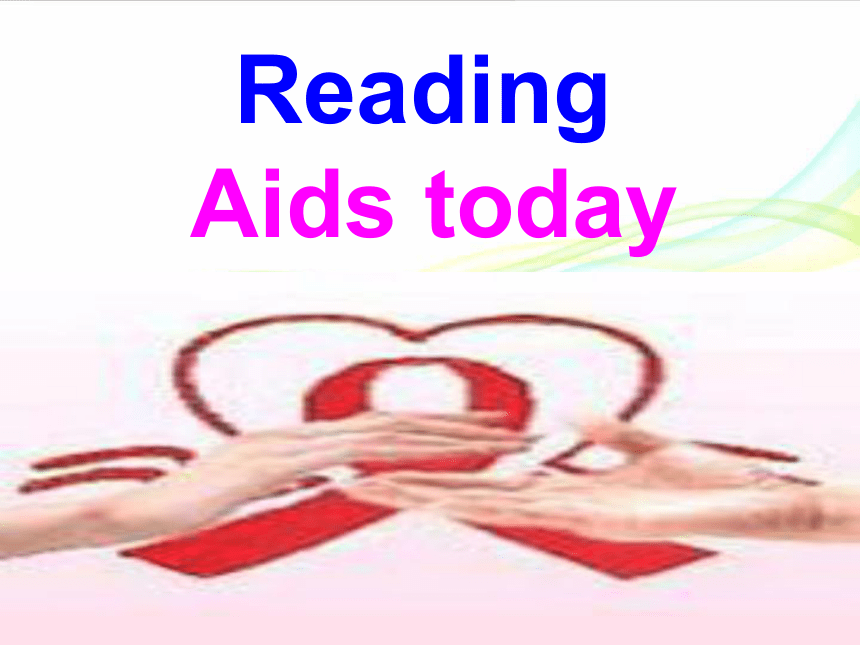 | |
| 格式 | zip | ||
| 文件大小 | 280.1KB | ||
| 资源类型 | 教案 | ||
| 版本资源 | 牛津译林版 | ||
| 科目 | 英语 | ||
| 更新时间 | 2012-12-15 13:57:34 | ||
图片预览


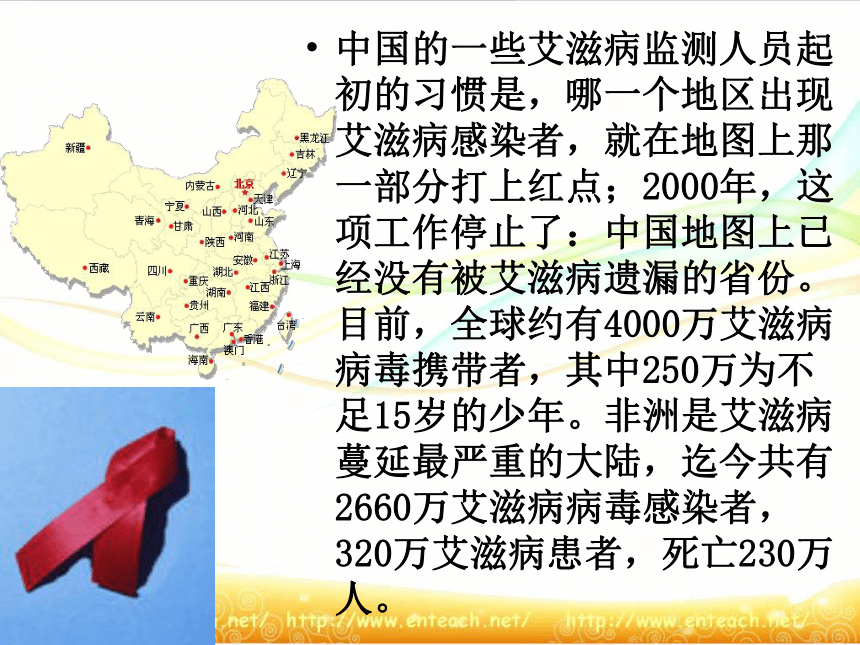
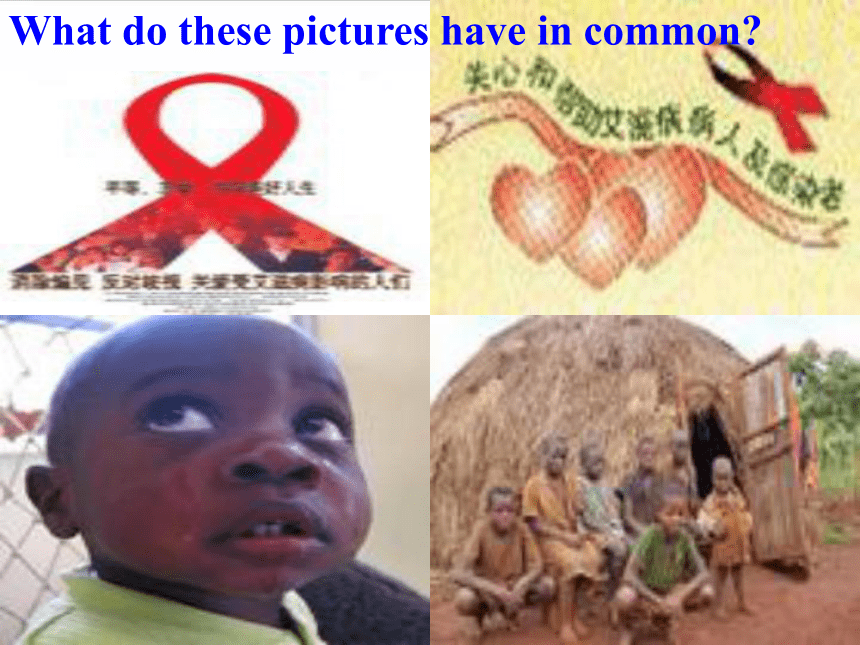

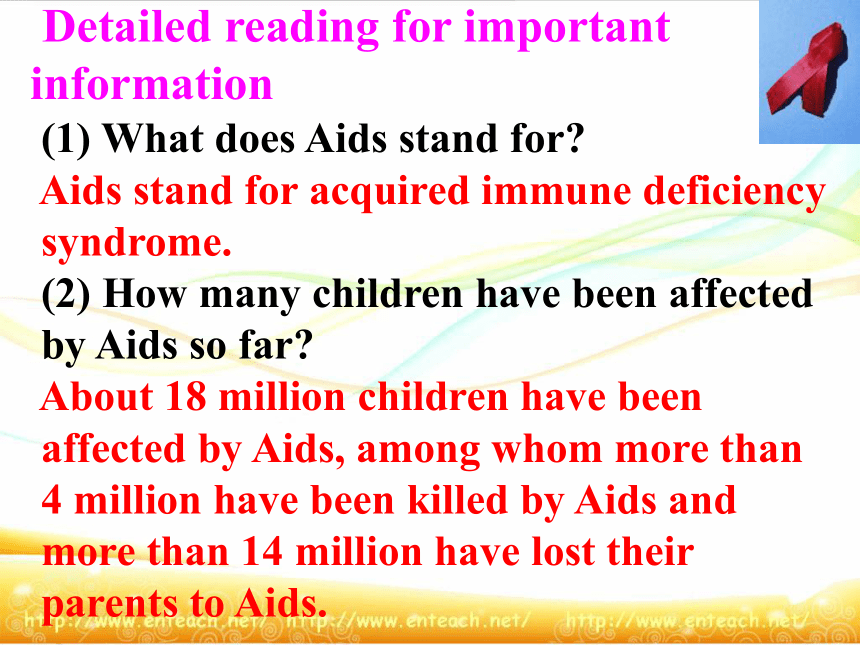


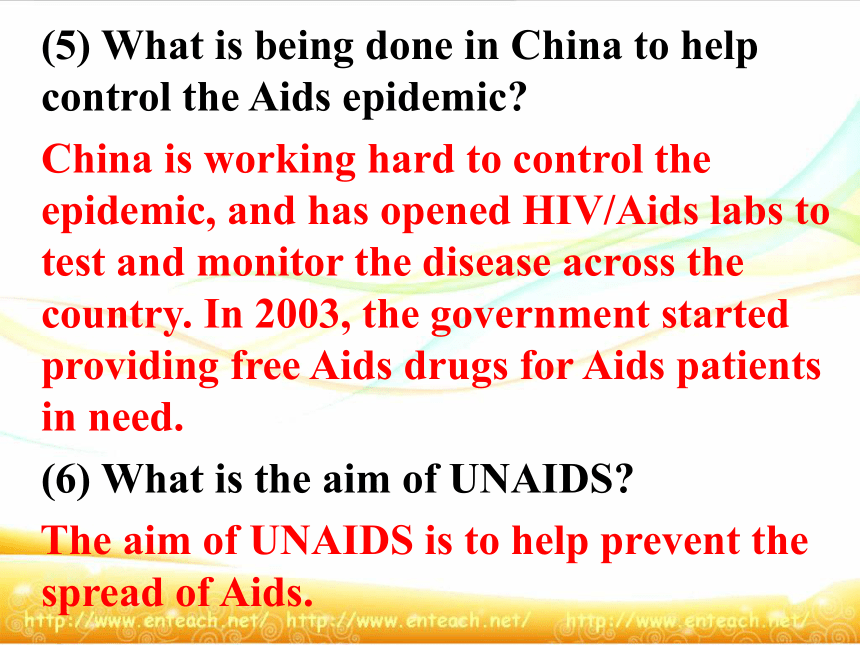
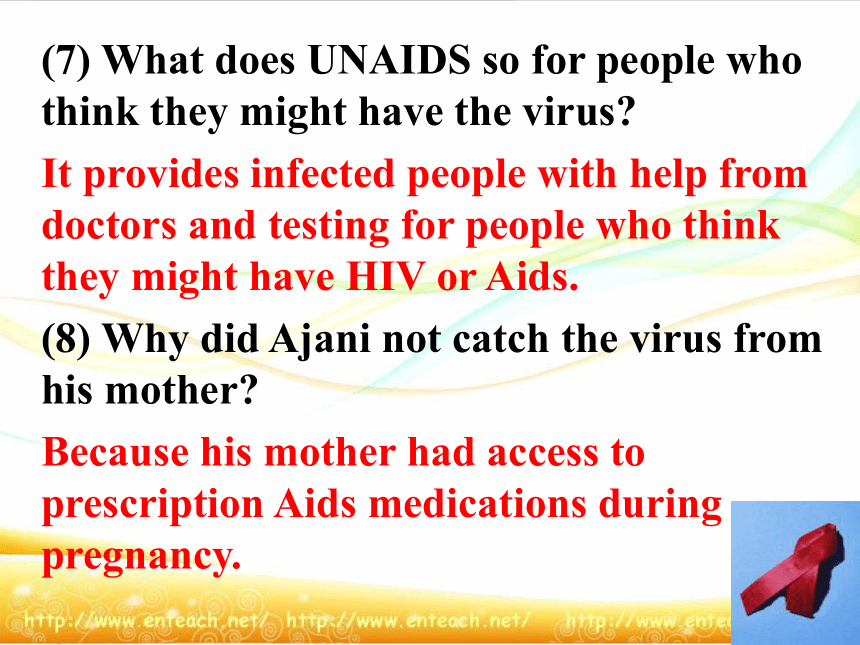
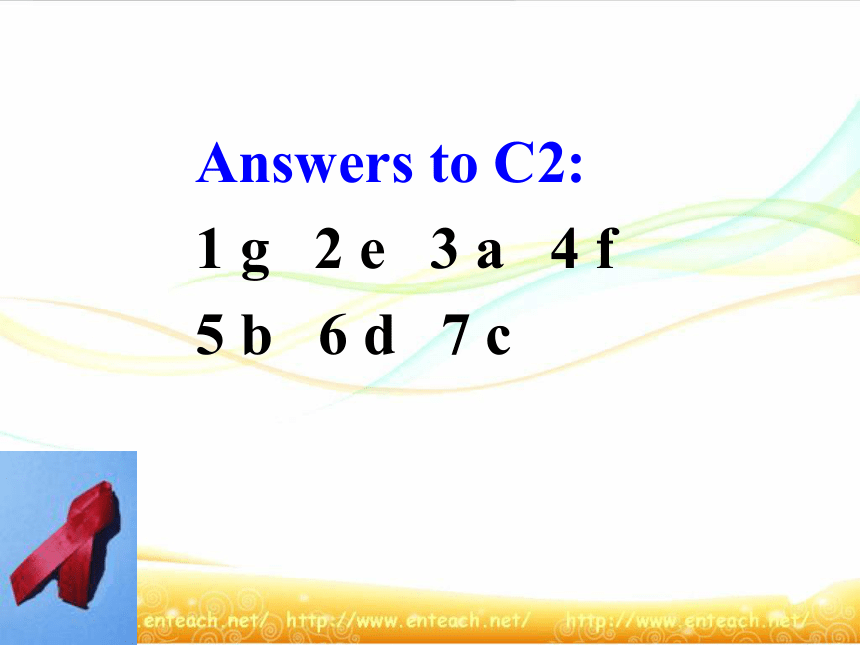
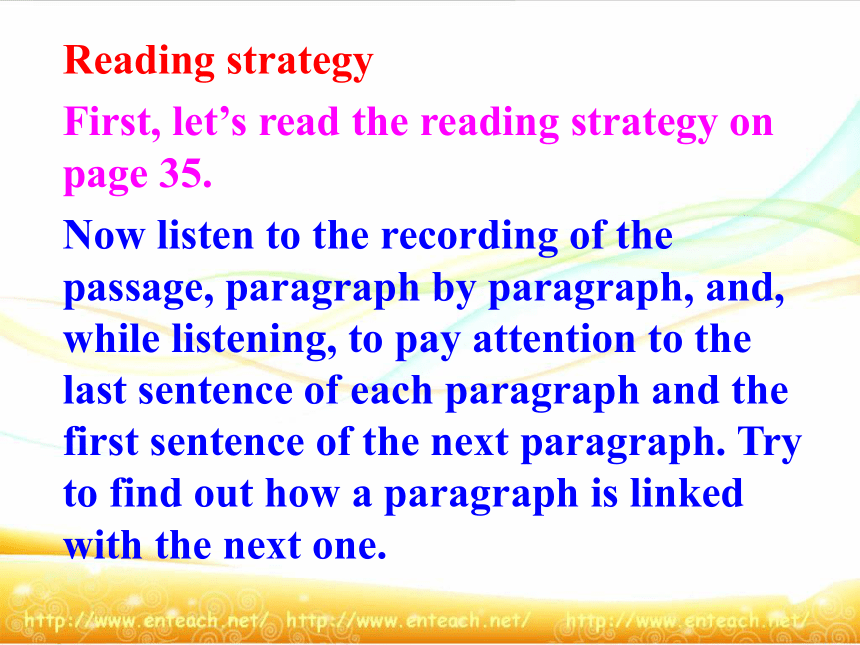
文档简介
课件38张PPT。Reading Aids todayA news report from the 18th World Aids Day人类关于艾滋病的确切记载大都始于1981年。在此之前,我们对这种疾病一无所知。我们不知道在20世纪的70年代,或者更遥远的过去,有多少人感染了艾滋病,也不知道它究竟起源于何处。艾滋病从一开始就被笼罩在重重迷雾之中。虽然众说纷纭,其中不乏合理的猜测和颇有科学依据的推论,但还没有哪一种观点能够得到世人的公认。
1981年,美国率先发现了艾滋病。四年后,艾滋病登陆中国。中国的一些艾滋病监测人员起初的习惯是,哪一个地区出现艾滋病感染者,就在地图上那一部分打上红点;2000年,这项工作停止了:中国地图上已经没有被艾滋病遗漏的省份。目前,全球约有4000万艾滋病病毒携带者,其中250万为不足15岁的少年。非洲是艾滋病蔓延最严重的大陆,迄今共有2660万艾滋病病毒感染者,320万艾滋病患者,死亡230万人。 What do these pictures have in common? Fast-reading for general idea. 1. What is this TV news special about?
It gives some detailed information about aids and how to fight the spread of Aids.
2. How many people around the world are infected with HIV every day?
About 14,000 people.
3. What places have been affected by Aids?
Almost every country in the world has been affected by Aids. Detailed reading for important information (1) What does Aids stand for?
Aids stand for acquired immune deficiency syndrome.
(2) How many children have been affected by Aids so far?
About 18 million children have been affected by Aids, among whom more than 4 million have been killed by Aids and more than 14 million have lost their parents to Aids. (3) How does HIV affect the body?
HIV is a virus that enters a person’s blood and attacks the body’s immune system, so the immune system is weakened, and them it gradually loses the ability to fight illnesses. Eventually the body’s immune system becomes so weak that the person becomes sick very easily. (4) What are the three ways Aids is transmitted?
The three ways are unprotected sex, blood-to-blood contact and mother-to-child transmission.
(5) What is being done in China to help control the Aids epidemic?
China is working hard to control the epidemic, and has opened HIV/Aids labs to test and monitor the disease across the country. In 2003, the government started providing free Aids drugs for Aids patients in need.
(6) What is the aim of UNAIDS?
The aim of UNAIDS is to help prevent the spread of Aids. (7) What does UNAIDS so for people who think they might have the virus?
It provides infected people with help from doctors and testing for people who think they might have HIV or Aids.
(8) Why did Ajani not catch the virus from his mother?
Because his mother had access to prescription Aids medications during pregnancy. Answers to C2:
1 g 2 e 3 a 4 f
5 b 6 d 7 c Reading strategy
First, let’s read the reading strategy on page 35.
Now listen to the recording of the passage, paragraph by paragraph, and, while listening, to pay attention to the last sentence of each paragraph and the first sentence of the next paragraph. Try to find out how a paragraph is linked with the next one. Answers to Part D:
1 b 2 e 3 h 4 a
5 f 6 c 7 g 8 d Answers to Part E:
1 epidemic 2 immune system
3 cure 4 serious
5 Africa 6 Argentina
7 monitor 8 prescription
9 efforts 10 prevention Discussion??? 1. What’s the serious situation of Aids in China? Why are there so many Aids patients in China?
2. What has been done to deal with the situation by governments and international organization?
3. What should be done and can be done to treat the Aids patients or HIV carriers?Language points 1. Unprotected sex is the most common way that the virus is spread, accounting for 75 percent of adult infections worldwide. (Page 34)
common
adjective the same in a lot of places or for a lot of people: Eg. It's quite common to see couples who dress alike. The surname 'Smith' is very common in Britain.
account for sth. phrasal verb, to form the total of something: Students account for the vast majority of our customers. 2. Although many people are familiar with Aids and how it is transmitted, more than a few people subscribe to the view that HIV and Aids are an African problem because the infection rates there are very high. (Page 34)are familiar with: 熟悉……的;通晓……
的
Are you familiar with this type of car?
你熟悉这种型号的汽车吗?
Are you familiar with the rules of baseball?
你熟悉棒球规则吗?
He is familiar with Chinese ancient history.
他通晓中国古代史。Cf: be familiar to 为某人所熟悉
The street was familiar to me. more than
(1) more than +数量词,表示“……以上”、“多于”
More than 500 workers were involved in strikes last month
(2) more than +形容词/副词/动词,表示“十分”,“非常”。
If you tell your father what you’ve done, he’ll be more than happy.
What he said more than disappointed me. (3) more than+名词,表示“不仅仅”,“不只是”
Learning English is more than a newspaper; it can also help to improve our English.
(4) more than…can /could, 意思是“不能……”,表示否定意义。
The cold was more than people could bear.
高考链接
--Do you need any help, Lucy?
--Yes. The job is _____ I could do myself. (2007福建)
A. less than B. more than
C. no more than D. not more than 3. Apart from government efforts, international help has also been very important in fighting Aids in China. (Page 35)
apart from: 除……外
All the children like music apart from Bobby.
除了博比外所有的孩子都喜欢音乐。
The writer lives apart from his family.
作家不与家人同住。 Apart from being too large, the trousers don't suit me.
这条裤子不但太大,而且我穿着也不合适。
Apart from a few words, I do not know any French at all.
除了很少的几句外,我对法语一无所知。
Test yourself
______ being fun and good exercise, swimming is a very useful skill. A. Except for B. Apart from
C. Or rather D. in spite of 介词besides,except,except for,but,apart from 和 in addition to 在用法上有何区别? besides 和 in addition to 同义,表示“除……之外(还)……”。但是,当与nothing,nobody或no one等否定意义的不定代词连用时,besides与except同义,表示“除…之外(其余都不)”。
例如:
She knows Japanese besides English. In addition to English, she knows Japanese.
All of them went to climb the mountain except me. except: 表示“除……外,(其余都)……”,常与“all,every,no,none,nothing”等含有整体肯定或否定意义的词连用。 except for: 它的宾语与前述对象完全是两回事。
例如:The room was very cold and, except for Jack, entirely empty.
这个房间很阴冷,而且除了杰克,完全是空荡荡的。 Except: 指同一类事物的总体中除去一部分。
如:He gets up early everyday except Sunday.
除星期天外,他每天早起。
Except that: 后面跟从句,语意与上同。
But: 常可与 except互换,强调“不在其中”。
例如:Everyone attended the meeting but Mary.
大家都出席了这次会议,但玛丽不在其列。 besides: 强调“除此之外,还包括”。
例如:She can speak French and Japanese besides English.
除英语外,她还会讲法语和日语。
apart from: 其含义主要依据上下文而定,有时可与except换用,有时可代替besides.
例如:Apart from the coat, the hat doesn't suit me.
除价钱太贵,这帽子也不适合我戴。 4. Their story was so sad that I had to choke back sobs. (Page 37)
choke: verb 哽咽,咽住,卡住
She choked to death on a fish bone. Children can choke on peanuts.
choke sth. back If you choke back feelings or tears, you force yourself not to show how angry or upset you are:
"John has had an accident, " she said, choking back the tears. Test yourself
1. Hearing her mean words, I stood there trembling and tying to ______ tears.
A. choke out B. choke on
C. choke back D. choke up
5. If everyone in world spent just a penny on it, we could make a really big difference! (Page 37)
make a difference 有影响,很重要; 区别对待
What you have done now will make a difference to your future.
A year or two will make a great difference to us.
Hueper made a difference between the two things. Homework
1. Finish Parts A1 and A2 on page 114 in the Workbook.
2. Prepare the part Word power.Thank you!
It gives some detailed information about aids and how to fight the spread of Aids.
2. How many people around the world are infected with HIV every day?
About 14,000 people.
3. What places have been affected by Aids?
Almost every country in the world has been affected by Aids. Detailed reading for important information (1) What does Aids stand for?
Aids stand for acquired immune deficiency syndrome.
(2) How many children have been affected by Aids so far?
About 18 million children have been affected by Aids, among whom more than 4 million have been killed by Aids and more than 14 million have lost their parents to Aids. (3) How does HIV affect the body?
HIV is a virus that enters a person’s blood and attacks the body’s immune system, so the immune system is weakened, and them it gradually loses the ability to fight illnesses. Eventually the body’s immune system becomes so weak that the person becomes sick very easily. (4) What are the three ways Aids is transmitted?
The three ways are unprotected sex, blood-to-blood contact and mother-to-child transmission.
(5) What is being done in China to help control the Aids epidemic?
China is working hard to control the epidemic, and has opened HIV/Aids labs to test and monitor the disease across the country. In 2003, the government started providing free Aids drugs for Aids patients in need.
(6) What is the aim of UNAIDS?
The aim of UNAIDS is to help prevent the spread of Aids. (7) What does UNAIDS so for people who think they might have the virus?
It provides infected people with help from doctors and testing for people who think they might have HIV or Aids.
(8) Why did Ajani not catch the virus from his mother?
Because his mother had access to prescription Aids medications during pregnancy. Answers to C2:
1 g 2 e 3 a 4 f
5 b 6 d 7 c Reading strategy
First, let’s read the reading strategy on page 35.
Now listen to the recording of the passage, paragraph by paragraph, and, while listening, to pay attention to the last sentence of each paragraph and the first sentence of the next paragraph. Try to find out how a paragraph is linked with the next one. Answers to Part D:
1 b 2 e 3 h 4 a
5 f 6 c 7 g 8 d Answers to Part E:
1 epidemic 2 immune system
3 cure 4 serious
5 Africa 6 Argentina
7 monitor 8 prescription
9 efforts 10 prevention Discussion??? 1. What’s the serious situation of Aids in China? Why are there so many Aids patients in China?
2. What has been done to deal with the situation by governments and international organization?
3. What should be done and can be done to treat the Aids patients or HIV carriers?Language points 1. Unprotected sex is the most common way that the virus is spread, accounting for 75 percent of adult infections worldwide. (Page 34)
common
adjective the same in a lot of places or for a lot of people: Eg. It's quite common to see couples who dress alike. The surname 'Smith' is very common in Britain.
account for sth. phrasal verb, to form the total of something: Students account for the vast majority of our customers. 2. Although many people are familiar with Aids and how it is transmitted, more than a few people subscribe to the view that HIV and Aids are an African problem because the infection rates there are very high. (Page 34)are familiar with: 熟悉……的;通晓……
的
Are you familiar with this type of car?
你熟悉这种型号的汽车吗?
Are you familiar with the rules of baseball?
你熟悉棒球规则吗?
He is familiar with Chinese ancient history.
他通晓中国古代史。Cf: be familiar to 为某人所熟悉
The street was familiar to me. more than
(1) more than +数量词,表示“……以上”、“多于”
More than 500 workers were involved in strikes last month
(2) more than +形容词/副词/动词,表示“十分”,“非常”。
If you tell your father what you’ve done, he’ll be more than happy.
What he said more than disappointed me. (3) more than+名词,表示“不仅仅”,“不只是”
Learning English is more than a newspaper; it can also help to improve our English.
(4) more than…can /could, 意思是“不能……”,表示否定意义。
The cold was more than people could bear.
高考链接
--Do you need any help, Lucy?
--Yes. The job is _____ I could do myself. (2007福建)
A. less than B. more than
C. no more than D. not more than 3. Apart from government efforts, international help has also been very important in fighting Aids in China. (Page 35)
apart from: 除……外
All the children like music apart from Bobby.
除了博比外所有的孩子都喜欢音乐。
The writer lives apart from his family.
作家不与家人同住。 Apart from being too large, the trousers don't suit me.
这条裤子不但太大,而且我穿着也不合适。
Apart from a few words, I do not know any French at all.
除了很少的几句外,我对法语一无所知。
Test yourself
______ being fun and good exercise, swimming is a very useful skill. A. Except for B. Apart from
C. Or rather D. in spite of 介词besides,except,except for,but,apart from 和 in addition to 在用法上有何区别? besides 和 in addition to 同义,表示“除……之外(还)……”。但是,当与nothing,nobody或no one等否定意义的不定代词连用时,besides与except同义,表示“除…之外(其余都不)”。
例如:
She knows Japanese besides English. In addition to English, she knows Japanese.
All of them went to climb the mountain except me. except: 表示“除……外,(其余都)……”,常与“all,every,no,none,nothing”等含有整体肯定或否定意义的词连用。 except for: 它的宾语与前述对象完全是两回事。
例如:The room was very cold and, except for Jack, entirely empty.
这个房间很阴冷,而且除了杰克,完全是空荡荡的。 Except: 指同一类事物的总体中除去一部分。
如:He gets up early everyday except Sunday.
除星期天外,他每天早起。
Except that: 后面跟从句,语意与上同。
But: 常可与 except互换,强调“不在其中”。
例如:Everyone attended the meeting but Mary.
大家都出席了这次会议,但玛丽不在其列。 besides: 强调“除此之外,还包括”。
例如:She can speak French and Japanese besides English.
除英语外,她还会讲法语和日语。
apart from: 其含义主要依据上下文而定,有时可与except换用,有时可代替besides.
例如:Apart from the coat, the hat doesn't suit me.
除价钱太贵,这帽子也不适合我戴。 4. Their story was so sad that I had to choke back sobs. (Page 37)
choke: verb 哽咽,咽住,卡住
She choked to death on a fish bone. Children can choke on peanuts.
choke sth. back If you choke back feelings or tears, you force yourself not to show how angry or upset you are:
"John has had an accident, " she said, choking back the tears. Test yourself
1. Hearing her mean words, I stood there trembling and tying to ______ tears.
A. choke out B. choke on
C. choke back D. choke up
5. If everyone in world spent just a penny on it, we could make a really big difference! (Page 37)
make a difference 有影响,很重要; 区别对待
What you have done now will make a difference to your future.
A year or two will make a great difference to us.
Hueper made a difference between the two things. Homework
1. Finish Parts A1 and A2 on page 114 in the Workbook.
2. Prepare the part Word power.Thank you!
同课章节目录
- 模块9
- Unit 1 Other countries, other cultures
- Unit 2 Witnessing time
- Unit 3 The meaning of colou
- Unit 4 Behind beliefs
- 模块10
- unit 1 building the future
- unit 2 people on the move
- unit 3 protecting ourselves
- unit 4 law and orde
- 模块11
- unit 1 careers and skills
- unit 2 getting a job
- unit 3 the secret of success
- unit 4 the next step
